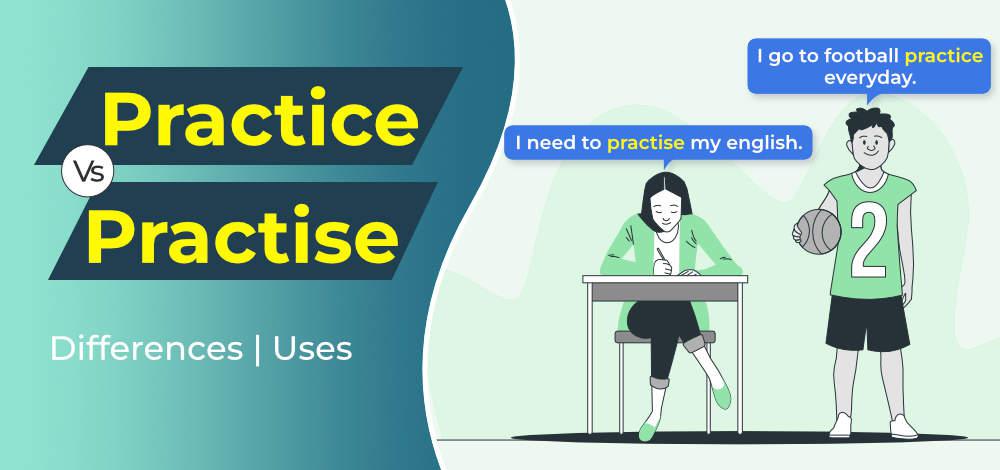Difference Between Practice and Practise – Practice vs Practise
Last Updated :
02 Aug, 2023
The word Practice, with a “c” and an “s”, is often confused in English. Both the terms differ in their usage and the context in which they are used. One is used as a verb and the other is used as a noun.

Practice vs Practise
Meaning of Practice
The word practice is used as a noun in British English and as both noun and verb in American English which means the actual application of an idea, a method, or a belief or to perform an activity or task repeatedly.
Usage
It is used to describe what really happens rather than what we think will happen in a particular situation.
Examples
- Officially Pharaoh is in charge but in practice, Joseph rule over the Country. ( Here in this example the word practice talks about something in reality )
- Rajesh doubted whether the plan is going to work in practice or not.
- It seemed like a good idea, but in practice, it was a disaster.
It is used to describe something which is regularly done, often as a habit, tradition, or custom.
Examples
- It was his usual practice to drop his Son at his School every morning on the way to his Office.
- Do you mind if we have a practice session before we start the game?
- Are you coming to Keyboard practice this evening?
It is used to describe a job or business involving a lot of skill or training.
Examples
- A Dental / Medical practice.
- It has been a week since Harsha started his CA practice.
- Sid has decided to leave the Hospital Service and join a private practice.
Meaning of Practise
The word practice is a verb in British English that means performing an activity or an exercise repeatedly in order to acquire proficiency in it.
Usage
It means to play something regularly or repeatedly in order to become skilled at it.
Examples
- I am quite good at playing Cricket but I need to practise my serve.
- Harsha practises his Keyboard every day.
- Some teachers use different techniques to make the students understand problems in Mathematics to practise on.
It means to work in a professional job for which vigorous training is required.
Examples
- How long have you been practising as a Charted Accountant?
- Raj practised Audio Engineering for 10 years.
- I have practised for more than five years to get a stand as an Intraday trader in the Stock Market.
It is also used when people practise something such as a custom, craft, or religion in which activities they take part in.
Examples
- He was born and brought up in a family which pratised traditional Judaism.
- Zero Budget Natural Farming, which is a natural farming technique used for high production and easy pest resistance is in practice in India for 20 years.
- The country has been among the list of countries which practise multi-party politics.
Practice vs Practise
| Word |
Part of speech |
Definition |
Usage |
Characteristics |
| Practice |
Noun |
The act of doing something regularly
or repeatedly in order to improve or
become proficient; a habit or custom
|
The doctor’s practice involves
seeing patients every day.
|
Commonly used in
American English.
|
| Practice |
Verb |
To perform an activity or task repeatedly
or regularly in order to improve or
become proficient.
|
She practices the piano for
hours every day.
|
Commonly used in
American English.
|
| Practise |
Noun |
A formal or professional activity, such
as a job or occupation.
|
He opened his own legal
practice last year.
|
Commonly used in
British English.
|
| Practise |
Verb |
To carry out a particular activity or job,
often as a profession; to engage in a
particular practice or habit.
|
She practises law in London. |
Commonly used in
British English.
|
Conclusion
The main difference between the two words is the spelling. In American English, the spelling is the same for both the noun and verb forms (practice). In British English, the noun form is spelled practice, while the verb form is spelled practise. Additionally, the meanings of the words can differ slightly based on the context in which they are used.
Share your thoughts in the comments
Please Login to comment...